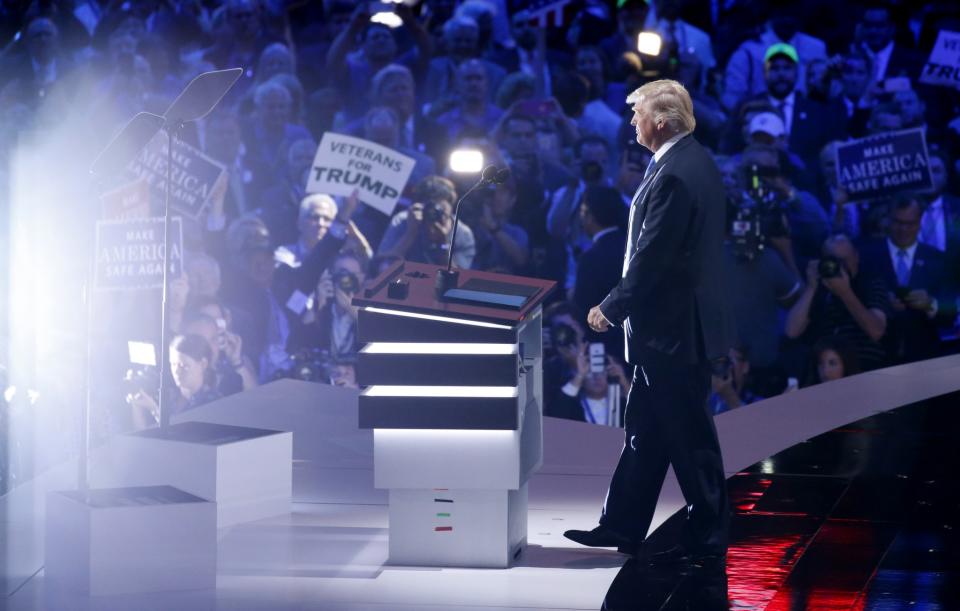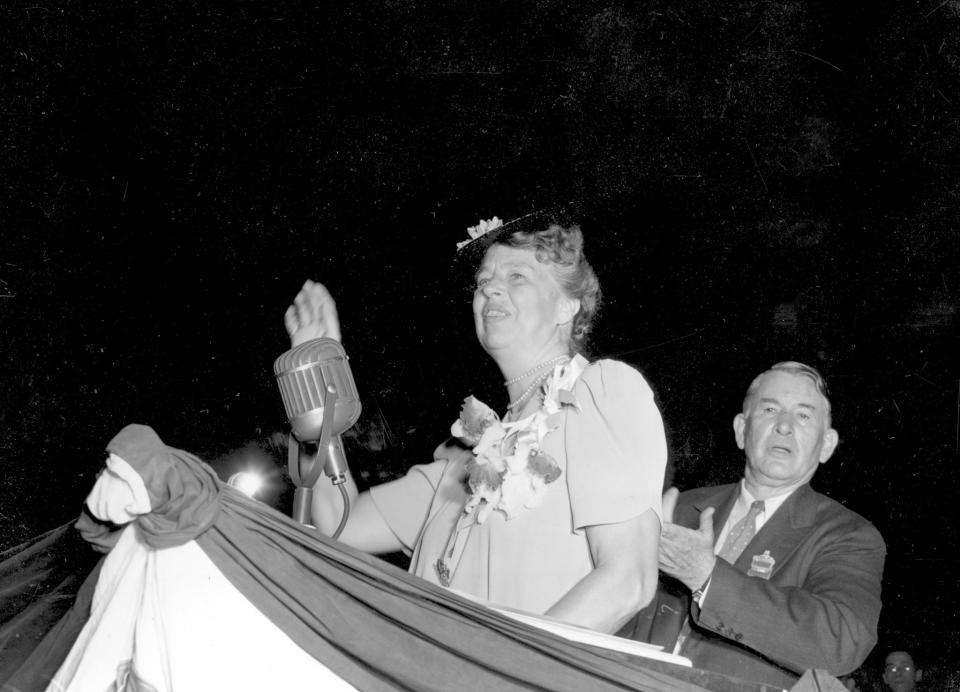The Trump unity project gets off to a slow start
Tonight, the Republican convention pivots to the economy from last night’s themes of national security and immigration. The GOP’s congressional leaders — House Speaker Paul Ryan, Sen. Mitch McConnell and Rep. Kevin McCarthy — will speak, as will two of Donald Trump’s children, Gov. Chris Christie and Ultimate Fighting Championship President Dana White. These elected leaders, family members and entertainers are going to be judged less by their economic messages than by what signals they send to a Republican Party still fractured over the wisdom and morality of Trump’s nomination.
A recent Washington Post poll revealed that Trump has the support of some 82 percent of registered Republican voters. Hillary Clinton has her share of problems bringing Bernie Sanders’ progressives into her camp. But Trump’s intraparty problems are significantly worse. Mitt Romney took 93 percent of the Republican vote in 2012, yet he still lost the election. It’s hard to see Trump prevailing in November without winning at least close to 90 percent of Republican voters. The absence of four out of the five living former GOP nominees from the arena — Bob Dole was in attendance — was one sign of the ongoing disunity in Republican ranks.
Yesterday didn’t bode well for tonight’s effort to present a more unified front. Trump’s top aide, Paul Manafort, teed up the GOP convention by telling reporters that Ohio Gov. John Kasich’s refusal to endorse Trump was “embarrassing his party in Ohio,” and he called the swing-state governor “dumb.”
Things worsened after that. The #NeverTrump delegates in the convention hall mounted a noisy floor fight in an attempt to force a roll-call vote, thus guaranteeing that the lead story about Day One would at a minimum feature the intraparty skirmishing that Republican National Committee officials had vowed to contain in Cleveland.

Other unscripted moments undercut the hope that the convention would achieve greater GOP cohesion. Former soap opera star and convention speaker Antonio Sabato Jr. told an interviewer after appearing onstage that he knew that President Obama “absolutely” was a Muslim. The episode gives Trump’s Republican critics fodder — as if they needed more — to argue that offering a major speaking slot to someone given to conspiracy-mongering was Exhibit A of amateur hour.
Melania Trump’s speech was partially cribbed from Michelle Obama’s much-lauded 2008 convention address. The campaign revealed that it still is not ready for the fall, sowing further doubts among Trump’s GOP skeptics.
And one of the first day’s more intriguing speeches — former Navy SEAL Marcus Luttrell’s relatively nonpartisan defense of military strength and impassioned plea on behalf of veterans — stood as an exception to the grim, apocalyptic oratory of former New York Mayor Rudy Giuliani, Wisconsin Sheriff David Clarke and retired Lt. Gen. Michael Flynn. The America they seemed to be describing — a society in which the rule of law had been destroyed — wasn’t one most Americans would recognize.
Conventions, among their other functions, give the nominee the chance to unite his or her party and rally partisans behind a common cause. From the stage, a party can offer a set of clear and consistent messages about the election stakes.
While Day One of Trump’s convention channeled Republicans’ shared antipathy for Clinton, Day Two is a chance to retrieve some of what was lost. There aren’t any do-overs. But if the party is going to unite behind Trump in any meaningful way, then more unity, professionalism and forthright pitches to wavering Republicans are urgently needed. Other than Melania Trump’s acknowledging in her talk that the primary had been “fierce,” little was said to give the loyalists of Kasich, Jeb Bush, Ted Cruz and Marco Rubio reasons to rethink their #NeverTrump positions. Will the message be pitched in a key that appeals to them tonight?
Conventions have long offered parties opportunities to unite as well as to fray at the seams. In 1940, first lady Eleanor Roosevelt’s convention address subtly urged Democrats opposed to the presence of progressive Henry Wallace on the ticket that the election presented them with more important issues, and that unity was essential. The first lady warned that Democrats must “rise above considerations which are narrow and partisan.” “You must know,” she added, “that this is the time when all good men and women give every bit of service and strength to their country that they have to give. This is the time when it is the United States that we fight for… .”
The first lady’s artful plea to anti-Wallace skeptics, as one delegate wrote her son-in-law, “saved the situation.” Wallace went on the ticket, and FDR, with a united party backing him, ultimately won a third term.

Much the opposite occurred at the Republicans’ highly divisive 1964 San Francisco Cow Palace convention. With the party fractured among supporters of conservative nominee Barry Goldwater and moderate primary foe Gov. Nelson Rockefeller, Goldwater used his address to articulate his conservative vision rather than to try to heal intraparty wounds opened up during a bitter primary contest. While Goldwater welcomed into his camp any Republican “who joins us in all sincerity,” he also went out of his way to warn “those who do not care for our cause [that] we don’t expect [you] to enter our ranks.” In another shot aimed at his GOP critics, Goldwater added, “Let our Republicanism, so focused and so dedicated, not be made fuzzy and futile by unthinking and stupid labels,” a dig at anti-Goldwaterites who had branded him an extremist.
In Cleveland last night, there was more Goldwater division than Eleanor Roosevelt unity. The stage featured few happy warriors appealing to conservative Republicans who regard Trump as ideologically adrift, ignorant about policy and, in Jeb Bush’s words, a “chaos candidate.” Nor was there much in last night’s messages that anti-Trump Republicans could use to set aside their deep-felt doubts, heal the primary’s still-festering wounds and unify behind Trump. The surprising lack of strong character witnesses detailing Trump’s personal strengths — Giuliani’s story about Trump’s support for NYC police was one exception — is likely to sow further doubts that Trump isn’t fit for the Oval Office.
The convention’s opening day — marred by pockets of chaos and the surfacing of intraparty resentments — was a setback for Trump’s unification project. Over the next three days in Cleveland, the GOP will have the chance to repair some of this damage.
Ryan and his fellow convention speakers have a chance to make news. By offering their full-throated endorsements of Trump’s character traits and leadership skills, and by appealing plainly to uncommitted skeptics, they can begin the hard work of unity that remains, remarkably at this late date, unfinished.
Matthew Dallek, an associate professor at George Washington University’s Graduate School of Political Management, is author of “Defenseless Under the Night: The Roosevelt Years and the Origins of Homeland Security.”
_____
Related slideshows:
On the ground at the RNC Convention – A photo report >>>
Melania Trump in the convention spotlight >>>
Convention floor erupts when no roll call taken to change rules to unbind delegates >>>
Demonstrators protest outside the RNC >>>


